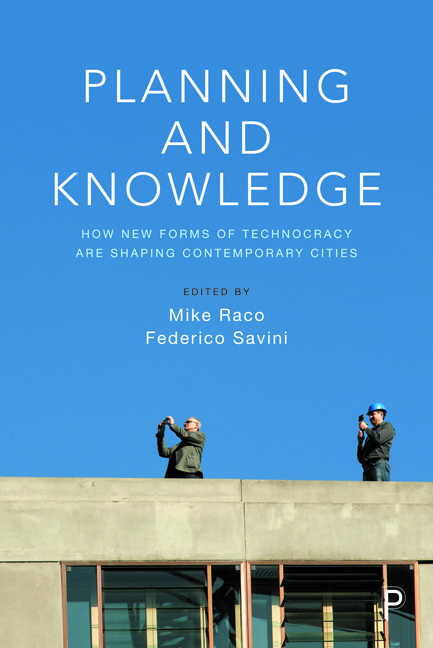Book contents
- Frontmatter
- Contents
- List of figures
- List of tables
- Notes on contributors
- Part I Conceptual framings of technocracy
- Part II Public planning and bureaucracies in contemporary urban development politics
- Part III Corporate knowledge and the land and property development sector
- Part IV Private consultants and the delivery of public policy
- Part V New constellations of actors and the management and governance of contemporary cities
- References
- Index
13 - Localism and the reconfiguration of planning’spublics in the landscapes of technocracy
Published online by Cambridge University Press: 30 April 2022
- Frontmatter
- Contents
- List of figures
- List of tables
- Notes on contributors
- Part I Conceptual framings of technocracy
- Part II Public planning and bureaucracies in contemporary urban development politics
- Part III Corporate knowledge and the land and property development sector
- Part IV Private consultants and the delivery of public policy
- Part V New constellations of actors and the management and governance of contemporary cities
- References
- Index
Summary
Introduction
This chapter explores the role of planning's publicswithin the emergent technocratic landscapes ofplanning. This is of particular importance given thewidely acknowledged fragmentation of contemporaryplanning and urban governance. On the one hand thereare the moves towards greater centralisation,technocratisation and privatisation where communityvoices and knowledge are excluded; arguably thespaces on which much of the research ontechnocracies has been focused. On the other areexperiments in localism and aspirations for thedecentralisation of power to neighbourhoods andcitizens (Brownill and Bradley, 2017): initiativeswhich touch on debates about the possibilities andlimitations of challenging ‘expert’ planning throughinsurgent and transformative knowledge and practices(Friedmann, 1987; Sandercock, 1998; Miraftab, 2009)and through co-production (Albrechts, 2013).However, these latter spaces are relativelyunexplored in relation to debates ontechnocratisation. This chapter therefore asks thequestion: what emerges in terms of ourunderstandings of the ‘new technocracy’ when weexplore such spaces and the roles the public isasked to perform in them?
It does so by drawing on ongoing research into thelocalism agenda in England and in particular onneighbourhood planning (NP), introduced in 2011 as a‘community right’ to draw up a statutory land-useplan (Smith, 2015). The aim is to shift the gaze ofresearch by considering whether, how and to whatextent elements of the modes of governanceassociated with the ‘new technocracy’ and alsooutlined in this volume introduction (see also Racoand Street, 2013) are present in such spaces and thepractices and relations which may be emerging withinthem. It therefore explores the extent to whichtechnical and ‘expert’ knowledge and the power ofpublic and private planners is being challenged ordisplaced by the knowledge, emotions and actions ofcitizen planners. As such the chapter shows thattechnocratisation is a more varied and complexprocess than previously thought and that theseseeming spaces of de-regulation are not immune toforms of re-regulation which seek to re-create localknowledge to align with technocratic language andpurposes. Localism as a form of statecraft (Wills,2016) is therefore reconfiguring the relationshipbetween communities, the private sector (developersand consultants) and the local and central staterather than representing ‘power to the people’.
- Type
- Chapter
- Information
- Planning and KnowledgeHow New Forms of Technocracy Are Shaping Contemporary Cities, pp. 169 - 180Publisher: Bristol University PressPrint publication year: 2019



